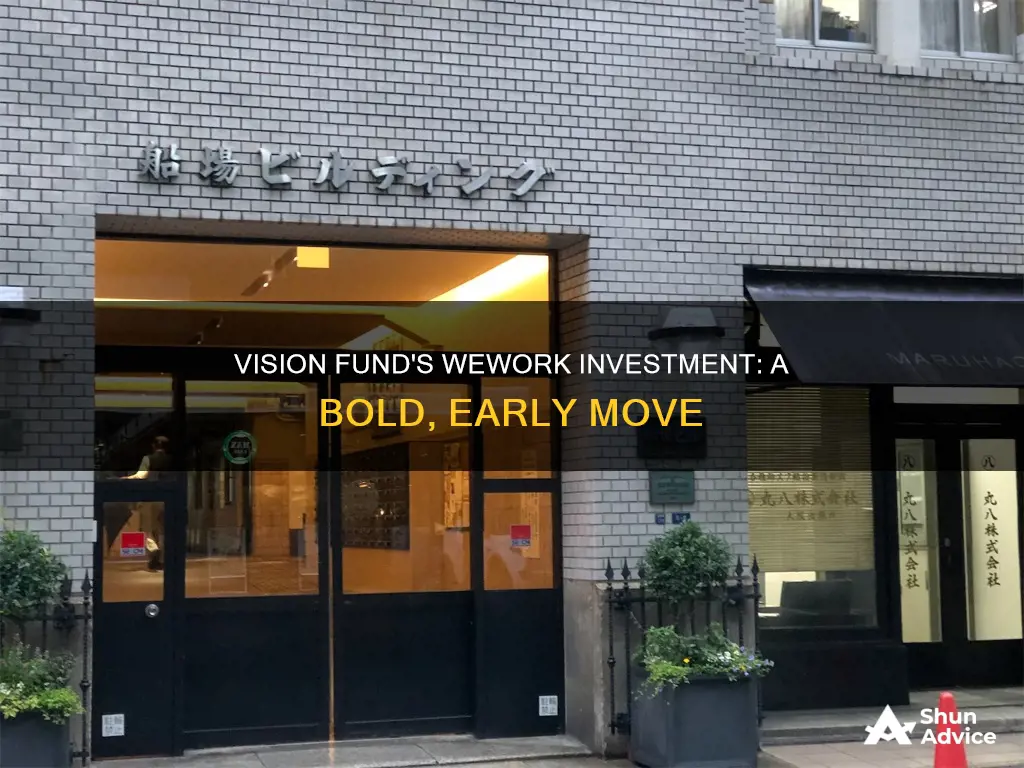
In August 2017, WeWork confirmed a $4.4 billion investment from SoftBank and its Vision Fund, with $3 billion going directly to WeWork and $1.4 billion invested into its subsidiaries in China, Japan, and the Pacific. This investment gave SoftBank a major presence on WeWork's board of directors, with the addition of SoftBank vice chairman Ronald D. Fisher and external director Mark Schwartz. The investment also aligned with WeWork's international expansion plans, which would unleash a new wave of productivity around the world, according to SoftBank CEO Masayoshi Son. However, the relationship between WeWork and SoftBank soured, with WeWork eventually filing for bankruptcy in November 2023, costing SoftBank billions of dollars in losses.
| Characteristics | Values |
|---|---|
| Date of Investment | August 2017 |
| Amount Invested | $4.4 billion |
| Investor | SoftBank Group and its Vision Fund |
| Recipient | WeWork, WeWork China, WeWork Japan, and WeWork Pacific |
| Investor's CEO | Masayoshi Son |
| Recipient's Cofounders | Adam Neumann and Miguel McKelvey |
What You'll Learn

SoftBank's Vision Fund lost $14 billion on WeWork
SoftBank's Vision Fund has lost billions of dollars on its investment in WeWork. In 2017, SoftBank, led by Masayoshi Son, invested $4.4 billion in WeWork, with $3 billion going directly into the company and the remaining $1.4 billion invested in its subsidiaries, WeWork China, WeWork Japan, and WeWork Pacific.
At the time of the investment, WeWork was valued at about $20 billion. However, the company failed to impress financial analysts, and its valuation took a hit when it decided to go public, dropping to around $3 billion from $47 billion in just a year. As a result, SoftBank had to step in with a $9.5 billion 'rescue package' and took over 80% of WeWork's shares.
WeWork's financial troubles continued, and its subsequent decline ended up costing SoftBank more than $14 billion in equity and debt losses. In 2020, SoftBank reported a record operating loss of about $13 billion as it wrote down the valuations of companies like WeWork. Specifically, the Vision Fund business lost $17.7 billion after writing down the value of its investments, with WeWork accounting for $4.6 billion of that loss.
The massive losses from the WeWork investment damaged Masayoshi Son's professional reputation and raised questions about his investment style and judgment. The failure of WeWork, along with other high-profile losses, prompted Son to adopt stricter due diligence and slow down investment activity.
Fund Setter: Minimum Investment Requirements and More
You may want to see also

WeWork's valuation reached $47 billion in 2019
However, WeWork's valuation more than doubled to $47 billion in 2019, primarily due to additional investments from SoftBank. In November 2018, WeWork received $3 billion from SoftBank, and in January 2019, it raised an additional $2 billion, bringing SoftBank's total funding in WeWork to over $10 billion. This inflated valuation was criticised as unrealistic and led to significant challenges when WeWork attempted its initial public offering (IPO).
The IPO was met with intense criticism over WeWork's governance, business model, and ability to turn a profit. As a result, co-founder and CEO Adam Neumann resigned and gave up majority voting control. The public valuation of the company dropped to around $10 billion, and WeWork's IPO plans were postponed.
The inflated valuation had significant consequences for WeWork's future. The company faced profitability challenges due to costly leases and corporate clients cancelling their contracts. WeWork's financial situation deteriorated to the point of bankruptcy, and SoftBank had to step in with a bailout package. Despite WeWork's eventual bankruptcy filing, SoftBank continued to invest in the company and attempted to restructure its operations.
Roth Funds: Where to Invest and Why
You may want to see also

WeWork's IPO filing revealed deep losses and conflicts of interest
WeWork's IPO filing in 2019 revealed deep losses and conflicts of interest, causing investors to balk and the company's valuation to plummet. The filing showed that the company's revenue and losses were ballooning, with losses mounting to $1.61 billion in 2018. WeWork's parent company, The We Company, lost $429 million on $436 million in revenue in 2016, with losses increasing to $890 million in 2017 as revenue grew to $886 million. In 2018, the company lost $1.6 billion on $1.8 billion in revenue, and in the first six months of 2019, it posted a loss of $690 million on $1.5 billion in revenue.
The IPO filing also revealed conflicts of interest, with CEO and co-founder Adam Neumann owning several of the buildings leased by WeWork. Neumann's leadership and behaviour also came under scrutiny, including reports of him smoking weed on a private jet, serving tequila shots to employees after discussing layoffs, and forcing WeWork to buy the trademark for the term "We" for $5.9 million. Neumann stepped down as CEO in September 2019 but remained as chairman of the board, receiving a $1.7 billion golden parachute from SoftBank, WeWork's biggest investor, to leave the board.
SoftBank, led by CEO Masayoshi Son, had invested billions in WeWork, lifting its valuation to $47 billion in early 2019. Son's infatuation with WeWork and other startups led to inflated valuations and hubris, which eventually led to a crash. WeWork's subsequent decline cost SoftBank more than $11.5 billion in equity losses and another $2.2 billion in debt. The debacle damaged Son's reputation as a shrewd investor and led to questions about his judgment and investment style.
Key Factors for Choosing the Right Mutual Fund Investments
You may want to see also

WeWork's bankruptcy filing caps a years-long saga
WeWork's subsequent decline has cost SoftBank more than $11.5 billion in equity losses and another $2.2 billion in debt. The public nature of WeWork's downfall, coupled with the Vision Fund's record loss of $32 billion, has severely damaged Son's reputation as a shrewd investor. Son's tendency to bid up valuations and his gut-based decision-making have drawn criticism, with some suggesting that his success may have made him overly confident in his own instincts.
WeWork's bankruptcy filing in November 2023 marked a stunning reversal of fortune for the company, which had been valued at $47 billion just four years earlier. The company's downfall was precipitated by a botched 2019 initial public offering and erratic behaviour by co-founder Adam Neumann. External factors, such as the Covid-19 lockdowns and the slow return to offices, also undermined demand for their services.
WeWork's bankruptcy has cast a shadow over the commercial real estate industry. The company's failure to turn a profit despite its massive valuation has raised questions about the sustainability of similar businesses. WeWork's bankruptcy filing is limited to its locations in the US and Canada, and the company will continue to operate while trying to shore up its finances. SoftBank and existing creditors have agreed to a restructuring deal that will reduce more than $3 billion of its debt.
The Mindset of Investment Fund Managers: Traits and Insights
You may want to see also

SoftBank's CEO Masayoshi Son's reputation was damaged by the investment
SoftBank CEO Masayoshi Son's reputation was damaged by the investment in WeWork, with the company losing billions. Son's investing style came under scrutiny, and his reputation as a shrewd investor was impacted.
Son's investment in WeWork revealed "breathtaking flaws" in his approach, according to some observers. Son overrode objections from his advisers and handed WeWork's founder, Adam Neumann, billions of dollars, resulting in a significant loss for SoftBank. The company's subsequent decline was highly public, and it battered Son's standing in the business world.
Son's tendency to bid up valuations and give founders more money than they asked for drew criticism from Silicon Valley rivals. His gut instinct-based decisions, such as his "infatuation" with WeWork, were questioned, and his early success with Alibaba may have compromised his judgment.
The losses from the WeWork investment, along with other failed ventures, led to a record loss for SoftBank's Vision Fund and prompted Son to adopt a more restrained approach to investing. Son's reputation was damaged not only by the financial losses but also by the perception that he had made significant mistakes and did not know what he was doing.
Son's investing style, characterised as "SoftBank on steroids," has led to concerns about corporate governance and conflicts of interest. As the founder, CEO, and largest shareholder of SoftBank, Son wields significant influence over the company's investment decisions, and his reputation has been closely tied to the success or failure of these ventures.
Real Estate Fund Investing: What You Need to Know
You may want to see also
Frequently asked questions
The Vision Fund, SoftBank's venture arm, first invested in WeWork in 2017.
The Vision Fund invested a total of $10 billion in WeWork.
No, the Vision Fund lost money on its investment in WeWork. The exact amount lost is unclear, with estimates ranging from $4.6 billion to $14 billion.
The Vision Fund's investment in WeWork was part of its strategy to give its portfolio companies an "unfair advantage" by providing them with the capital to hire more engineers, sell products cheaper, and outspend competitors.







